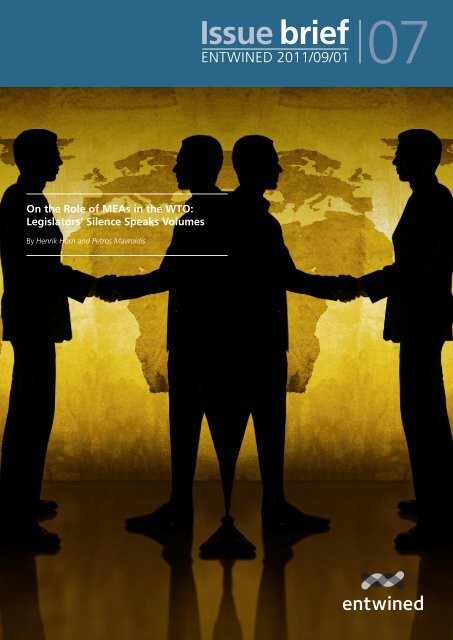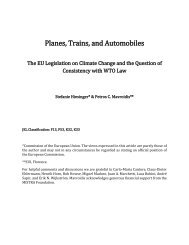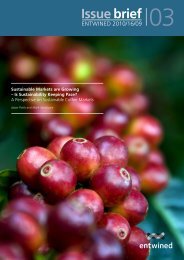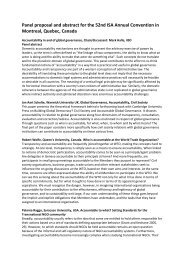Issue brief - Entwined
Issue brief - Entwined
Issue brief - Entwined
Create successful ePaper yourself
Turn your PDF publications into a flip-book with our unique Google optimized e-Paper software.
<strong>Issue</strong> <strong>brief</strong><br />
ENTWINED 2011/09/01<br />
07<br />
On the Role of MEAs in the WTO:<br />
Legislators’ Silence Speaks Volumes<br />
By Henrik Horn and Petros Mavroidis
ABOUT THE AUTHORS<br />
Henrik Horn wrote his dissertation in economics<br />
at the Institute for International Economic<br />
Studies, Stockholm University, where he stayed<br />
until his resignation in 2007, the last 13 years as<br />
Professor of International Economics. He is since<br />
2006 Senior Research Fellow at the Research Institute<br />
of Industrial Economics (IFN) in Stockholm, Non-Resident<br />
Senior Fellow at Bruegel, a Brussles-based think tank, and Chief<br />
Reporter (jointly with Petros C. Mavroidis) for the American Law Institute<br />
project Principles of World Trade Law: The World Trade Organization.<br />
Horn is Research Fellow in the International Trade and<br />
Industrial Organization Programmes of the Centre for Economic<br />
Policy Research, London, Editorial Board member of the World<br />
Trade Review, and Associate Editor of the Journal of World Trade.<br />
He has taught at e.g. Stockholm University, Stockholm School of<br />
Economics, the University of Michigan, Princeton University, the<br />
World Trade Institute (Bern), and the Graduate Institute of International<br />
Studies (Geneva), has served as a judge in the Swedish<br />
Supreme Court for antitrust cases, and he has worked for four<br />
years in the Economic Research and Analysis Division of the WTO.<br />
Petros C. Mavroidis is Edwin B. Parker Professor<br />
of law at Columbia Law School, New York and<br />
Professor of Law at the Un. of Neuchâtel, Switzerland.<br />
He is also Research Fellow at the Centre for<br />
Economic Policy Research (CEPR) in London. Since<br />
2000 he has been acting as chief co-reporter<br />
(along with Henrik Horn) for the American Law Institute (ALI) project,<br />
“International Trade Law: the WTO”. His latest publication is<br />
“The Law of the WTO” (co-authord with George Bermann (Columbia)<br />
and Mark Wu (Harvard), ThomsonReuters, 2010. He is currently<br />
on leave from Columbia Law School and teaching at EUI, Florence.
ON THE ROLE OF MEAS IN THE WTO: LEGISLATORS’ SILENCE SPEAKS VOLUMES<br />
On the Role of MEAs in the WTO:<br />
Legislators’ Silence Speaks Volumes<br />
By Henrik Horn and Petros Mavroidis<br />
THIS BRIEF TARGETS<br />
• Policy makers in the environment and trade area.<br />
KEY MESSAGES<br />
• The role of multilateral environmental agreements (MEAs)<br />
in the World Trade Organization (WTO) legal order is highly<br />
unclear, due to lack of legislation and case law on the issue.<br />
• To determine the appropriate role of MEAs in the WTO, it<br />
is necessary to understand the reasons for the separation of<br />
agreements.<br />
• One can identify two broad reasons for separation: strategic<br />
benefits for certain countries, and contracting costs stemming<br />
from large, complex agreements.<br />
• Both of these reasons for separation suggest a very cautious<br />
approach to MEAs by WTO adjudicating bodies.<br />
• The main role of MEAs should be to provide factual information<br />
concerning environmental issues.<br />
purpose of issue <strong>brief</strong>: The purpose of this Brief is to point<br />
to reasons why adjudicating bodies of the World Trade Organization<br />
(WTO) should be cautious when drawing on multilateral<br />
environmental agreements. The main purpose of such<br />
agreements should be to provide factual information for adjudicating<br />
such disputes.<br />
International efforts to combat environmental problems are manifested<br />
in a large number of multilateral environmental agreements<br />
(MEAs). These agreements typically regulate economic activity,<br />
and as such have consequences for international trade. They may<br />
thus interfere with international trade agreements, and in particular<br />
the World Trade Organization (WTO) Agreement, which provide<br />
separate regulations of international economic activities. Despite<br />
the overlaps of the two sets of regulations, the role of MEAs in the<br />
WTO remains controversial. Legislators and WTO adjudicating<br />
bodies have so far shown little enthusiasm for a narrowing of the<br />
two, but there are frequent calls in the policy debate for recognition<br />
of MEAs in the WTO legal order. This <strong>Issue</strong> Brief suggests reasons<br />
why judges in disputes before the WTO should be cautious when<br />
drawing on MEAs.<br />
THE STATUS OF MEAS IN THE WTO<br />
The basic problem for defining the role of MEAs in the WTO<br />
is the fact that they are not among the covered agreements, that<br />
is, among the multilateral and plurilateral agreements that form<br />
the WTO Agreement. Hence, they are not included in the agreements<br />
that WTO Members must respect to comply with the WTO<br />
Agreement. The WTO Agreement is completely silent with regard<br />
to MEAs. In principle, this lacuna could have been filled by the<br />
WTO Committee on Trade and the Environment (CTE) and the<br />
other competent WTO bodies. The Agreement Establishing the<br />
WTO provides explicitly for this possibility to ‘complete’ the original<br />
contract (Art. IX). However, no substantive progress has been<br />
made there, despite many years of discussion. It has therefore been<br />
left for WTO judges to determine the role of MEAs in the WTO,<br />
but without any legislative guidance.<br />
ISSUE BRIEF<br />
3
ON THE ROLE OF MEAS IN THE WTO: LEGISLATORS’ SILENCE SPEAKS VOLUMES<br />
WTO judges have only addressed the role of MEAs in a few disputes.<br />
The first dispute was US – Shrimp, which concerned the possibility<br />
for a WTO Member to regulate activities occurring outside<br />
its own territory. In this dispute, the Appellate Body (AB) showed<br />
a somewhat open attitude toward MEAs. 1 It referred to CITES,<br />
an MEA, in order to cement its understanding of what constitutes<br />
an exhaustible natural resource, one of the issues before it. It did<br />
acknowledge CITES’ relevance, based on the fact that parties to<br />
the dispute were signatories to CITES. But the AB did not take the<br />
full step of explicitly recognizing what exactly the legal relevance of<br />
MEAs is. The more appropriate interpretation of this report would<br />
lead us to conclude that in the AB’s view, recourse of MEAs is left<br />
totally to the discretion of the WTO judge. Hence, in theory, we<br />
might never again experience recourse to MEAs by WTO judges.<br />
The second decision addressing the role of MEAs was a panel decision<br />
in EC – Approval and Marketing of Biotech Products – sometimes<br />
called the “Biotech” dispute. In this case, the Panel dismissed<br />
the relevance of an MEA – the Biosafety Protocol – on grounds that<br />
not all parties to the dispute had ratified the MEA. The Panel did<br />
not indicate what the role of the MEA would have been, had all<br />
parties been members. Commentators by and large criticized this<br />
decision, arguing that it rests on flimsy grounds.<br />
The essence of the legal landscape is, hence:<br />
• Neither the WTO nor most MEAs provide any explicit guidance<br />
on how to view the relationship between the two bodies of<br />
law;<br />
• WTO Members have refrained from resolving the issue through<br />
other means; and<br />
• WTO case law has largely avoided the issue, or has been reluctant<br />
to make general determinations.<br />
It is thus fair to say that the role of MEAs in the WTO is, as a matter<br />
of law, highly uncertain.<br />
WHY FORM SEPARATE AGREEMENTS?<br />
In our view, the appropriate relationship between MEAs and WTO<br />
law must be addressed in light of reason(s) why the parties have chosen<br />
to form separate agreements on trade and on the environment. It is<br />
not a trivial issue to identify these reasons, since there are several<br />
advantages for countries to form a single agreement rather than<br />
separate ones.<br />
First, a single agreement could enhance the possibility of enforcing<br />
obligations, in particular in the environmental area. Second,<br />
a single agreement would reduce duplication of certain efforts<br />
required to negotiate and administer agreements. Third, a<br />
single agreement could allow for linkages between trade and the<br />
environmental concessions, thus allowing cooperation between<br />
countries to go further than is possible with separate agreements.<br />
So, why would countries forego these benefits of a single agreement?<br />
We believe there are two broad reasons.<br />
First, there may be “strategic” benefits to certain countries of<br />
imposing separate negotiations and agreements. To see why, note<br />
that negotiations can be organized in a variety of “bargaining formats”.<br />
To give just a few examples: (i) one area (say tariffs) is<br />
negotiated first, and only when an agreement on tariffs has been<br />
reached is the other area (environment) negotiated; (ii) both areas<br />
are negotiated simultaneously through separate negotiating processes,<br />
and there is immediate implementation of an agreement<br />
in one area even if negotiations are on-going in the other area; or<br />
(iii) both areas are negotiated simultaneously but implementation<br />
only occurs when there is agreement in both areas.<br />
Such differences in bargaining format can have profound impact<br />
on the outcome in terms of e.g. the distribution of the surplus<br />
from the cooperation. For instance, in a negotiation between two<br />
4 ISSUE BRIEF
ON THE ROLE OF MEAS IN THE WTO: LEGISLATORS’ SILENCE SPEAKS VOLUMES<br />
countries A and B where country A stands to gain significantly<br />
from a trade agreement, country A may be anxious to see the trade<br />
agreement implemented as soon as possible to avoid delaying the<br />
implementation of this agreement. But the bargaining position of<br />
country A would be rather weak in the environmental negotiations<br />
if implementation of the trade agreement is contingent on<br />
an environment agreement. Country B would then benefit from<br />
enforce a bargaining format where the two negotiations are linked<br />
in this manner. Or, countries for which environmental commitments<br />
are costly may prefer to keep environment outside the trade<br />
agreement, in order to avoid having their environmental concessions<br />
being enforced through potent trade countermeasures.<br />
These are examples of “strategic” benefits of separation.<br />
Second, the separation of trade and environmental agreements<br />
may reduce “contracting costs”. International trade and environment<br />
negotiations are not mere antagonistic haggling over how<br />
to distribute the costs and benefits of trade liberalization and<br />
environmental protection; it is rare that a “cake” of known size<br />
and properties lies on the table when the negotiations begin. A<br />
central role of negotiations is to identify packages of concessions<br />
ISSUE BRIEF<br />
5
ON THE ROLE OF MEAS IN THE WTO: LEGISLATORS’ SILENCE SPEAKS VOLUMES<br />
that would provide benefits to all parties. That is, negotiators do<br />
not only divide the cake, they also largely “bake” it. This can be<br />
very costly, for two reasons. First, negotiations utilize administrative<br />
resources, both at the negotiating table and in ministries and<br />
governmental agencies of the parties, in particular in the form of<br />
labour. Second, negotiating a large agreement takes time, implying<br />
that the parties have to wait before they can enjoy the fruits of<br />
their cooperation – in economic terms, there is a welfare loss due<br />
to the discounting of the future benefits of the agreement.<br />
Parties forming agreements take into consideration negotiation<br />
and implementation costs alongside the benefits that the agreements<br />
are expected to yield from reduced international externalities.<br />
It may, therefore, be desirable to forego the gains of very elaborate<br />
agreements if such agreements are very costly to bring about.<br />
The parties will instead settle on cruder, but cheaper, agreements.<br />
The literature suggests several ways of reducing such costs. For instance,<br />
contractual bindings can be rigid rather than conditioned<br />
on changes in the economic environment, an example being tariff<br />
bindings that apply irrespective of changes in demand and supply<br />
conditions. The agreement may also lack bindings, and instead<br />
leave discretion over certain policies to the parties, such as the<br />
GATT, which leaves discretion over domestic instruments to the<br />
Members. In addition, contractual provisions may be expressed<br />
vaguely in order to reduce negotiation efforts. These methods of<br />
reducing negotiation costs imply that the resulting agreements are<br />
incomplete in various ways.<br />
In Horn and Mavroidis (2011) we propose an alternative<br />
means of reducing negotiation costs: separating negotiations and<br />
agreements. In particular, negotiations over a single, complete<br />
agreement that comprises both trade and environment would obviously<br />
be extremely costly. By negotiating separate agreements<br />
in the two policy areas the parties can conclude the negotiations<br />
more quickly. This approach is also likely to reduce administrative<br />
resource requirements, since resources will not have to be spent<br />
on coordination across issues. Of course, the cost savings come at<br />
a price: the parties have to forego any benefits of a single agreement.<br />
IMPLICATIONS FOR THE ROLE OF MEAS IN WTO DISPUTES<br />
In seems plausible that the separation of trade and environmental<br />
agreements is the result of both the strategic benefits that separation<br />
yields for certain countries and the costs associated with<br />
negotiating an agreement encompassing both trade and the environment.<br />
What is the implication of this for the appropriate role<br />
of MEAs in the WTO legal order?<br />
First, while strategic reasons may explain separation of agreements,<br />
they do not seem to explain why the separate agreements<br />
would have gaps. Where separation is driven by strategic considerations<br />
(i.e., parties have intentionally kept the MEA outside the<br />
WTO), the case-law path must be trod with great caution. Judges<br />
are in clear danger of undoing the balance of righs and obligations<br />
between WTO Members if their decisions short-circuit the two<br />
agreements.<br />
Second, where negotiating costs explain separation of MEAs<br />
and the WTO, WTO Members have abstained from sorting out<br />
the relationship between obligations in the two sets of agreements.<br />
It is therefore unclear to the parties how to best view the relationship<br />
between them. Intuitively, it would then seem exceedingly<br />
difficult for WTO judges to identify solutions that would be in<br />
the long-term interest of all countries.<br />
These two sets of reasons for the separation of WTO and MEAs<br />
lead us to conclude that caution is recommended on the part of<br />
WTO judges. However, we still believe that MEAs could provide<br />
a useful role in adjudication, as sources of information. For instance,<br />
an MEA may contain information regarding factual aspects<br />
of dangerous substances, or about the extent to which environmental<br />
measures are based on scientific evidence. As long as<br />
WTO judges do not alter the balance of rights and obligations<br />
between the WTO Members, it would be beneficial for the both<br />
the trading system and the environment that WTO judges use<br />
such knowledge embedded in MEAs.<br />
In conclusion, the reluctance of WTO adjudicating bodies to<br />
fully embrace MEAs is warranted. Legislators’ silence should speak<br />
volumes to WTO judges.<br />
WAY FORWARD<br />
It seems highly unlikely that this issue will be settled through<br />
legislative action at the WTO level. In today’s world, where the<br />
entire Doha round is at stake, it is doubtful that negotiators<br />
will add such a thorny issue to the current workload. One can<br />
expect resolution of the issue at the adjudication level. The key<br />
is to help participants in the process to understand that in the<br />
long run it is in the common interest to encourage informed<br />
rather than uninformed judgments.<br />
POLICY IMPLICATIONS/<br />
POLICY RECOMMENDATIONS<br />
WTO adjudication is, by definition, a reaction to submitted<br />
<strong>brief</strong>s. If WTO Members insist on invoking MEAs when lodging<br />
their <strong>brief</strong>s, WTO adjudicating bodies will find it difficult<br />
to ignore them. Civil society, through amicus curiae, could also<br />
play a role here.<br />
The ‘legislative arm’ of the WTO has not offered anything so<br />
far, but has at least kept alive the possibility of working out<br />
the role of MEAs in the WTO. The composition of the WTO<br />
Committee on Trade and the Environment is likely to importantly<br />
influence the possibility of progress on this issue. If those<br />
participating in this committee came from departments dealing<br />
with environmental protection (as opposed to pure trade departments),<br />
bridges to MEAs may be built more naturally. The<br />
WTO Committee on Technical Barriers to Trade is an excellent<br />
illustration of how making room for technical expertise can<br />
lead to informed judgments and help resolve trade concerns; a<br />
number of potential disputes are being discussed therein and<br />
only very few end up before WTO Panels.<br />
6 ISSUE BRIEF
REFERENCES AND FOONOTES<br />
Horn, Henrik and Petros C. Mavroidis. MEAs in the WTO: Silence Speaks Volumes.<br />
Mimeo.<br />
1 The WTO Agreement includes a two-tier dispute settlement system, with “panels” at<br />
the lower level and the AB as the WTO “supreme court”.<br />
<strong>Issue</strong> <strong>brief</strong><br />
Stockholm 2011/09/01<br />
ENTWINED<br />
Box 210 60<br />
SE-100 31 Stockholm<br />
Sweden, +46 (0)8 598 56 300<br />
info@entwined.se<br />
www.entwined.se<br />
Editor: Erika Svensson, Communication Manager<br />
Financed by Mistra<br />
Production: Capito AB<br />
Photography: Istockphoto<br />
Printed by: Tryckeri AB Orion, 2011
The reseach programme ENTWINED – Environment and Trade<br />
in a World of Interdependence – examines the interplay between<br />
the global trade regime and environmental policies<br />
promulgated by governments and private entities with a<br />
particular focus on the treatment of transboundary problems.<br />
ENTWINED is actively engaged with policy makers and other<br />
stakeholders to the Trade and Environment Debate. The team<br />
includes researchers specializing in environmental and natural<br />
resource economics, international economics and trade law.<br />
The programme has its focus in Sweden, but engages leading<br />
experts in other locations, including Geneva, New York,<br />
Washington and Montreal. The ENTWINED programme is<br />
funded by the Swedish Foundation for Strategic Environmental<br />
Research, Mistra, see www.entwined.se





